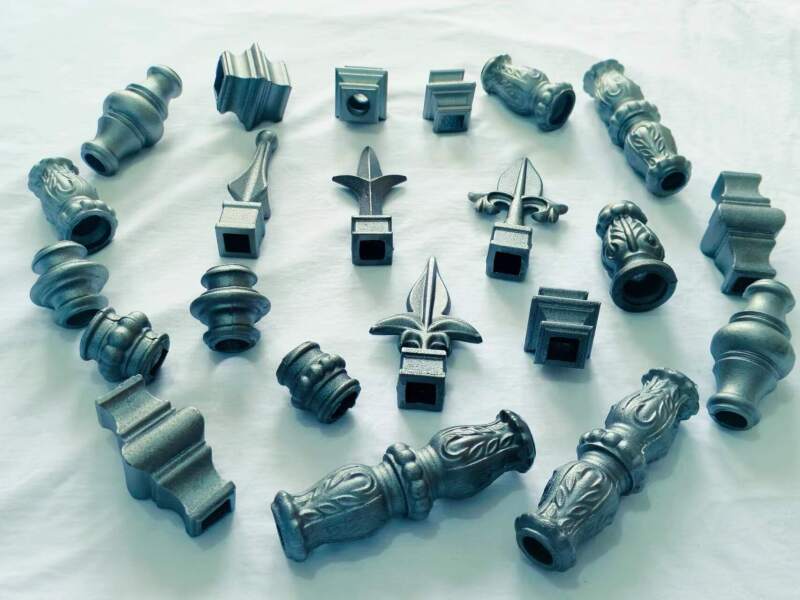
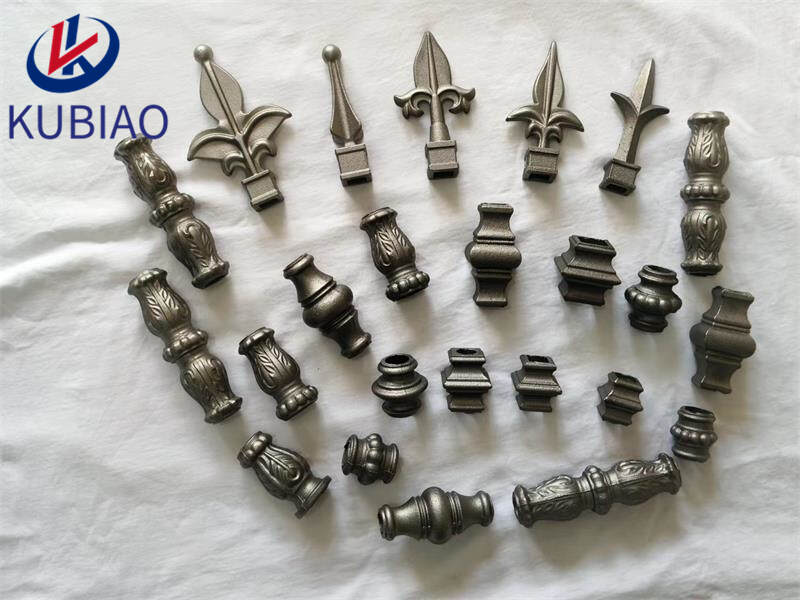
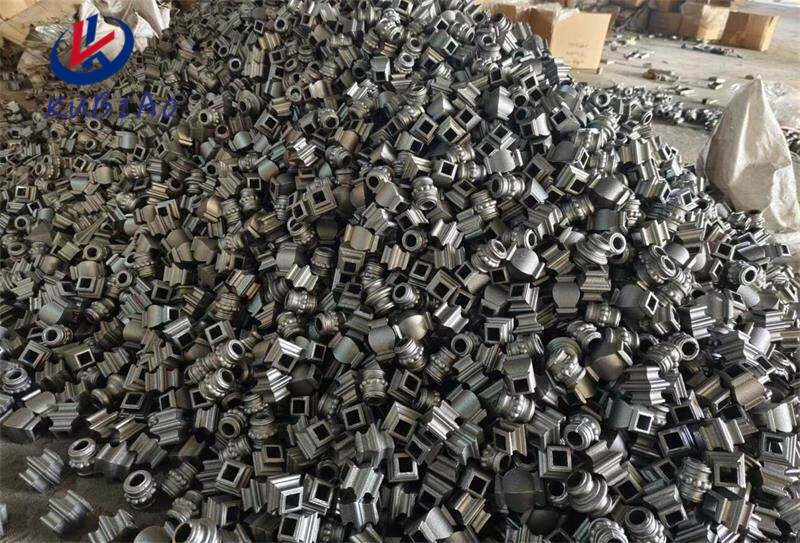
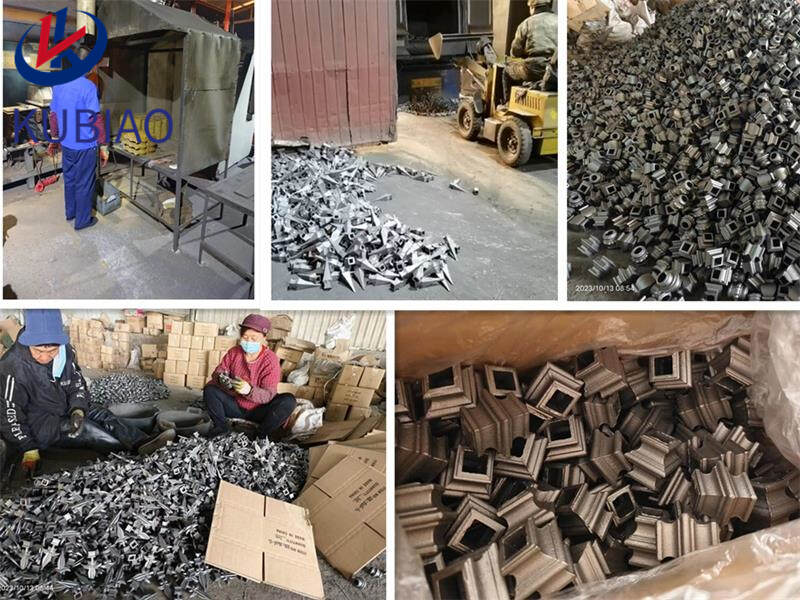
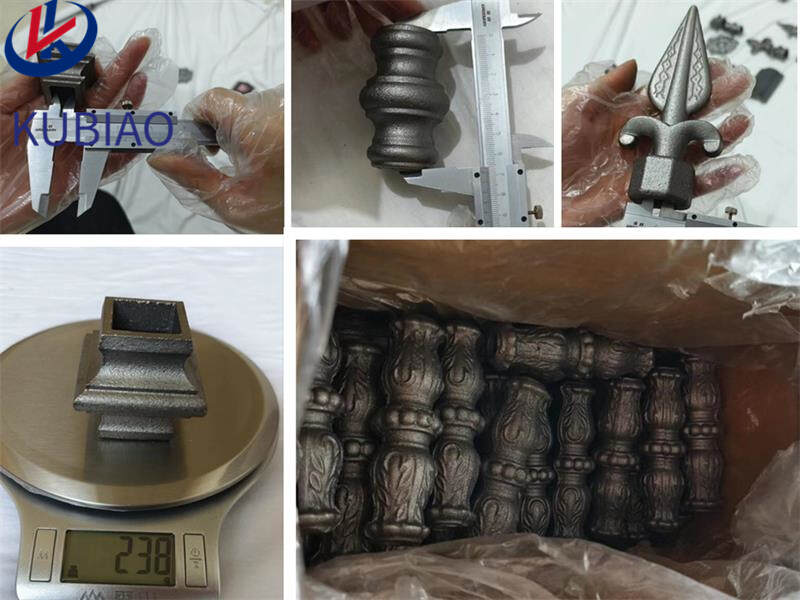
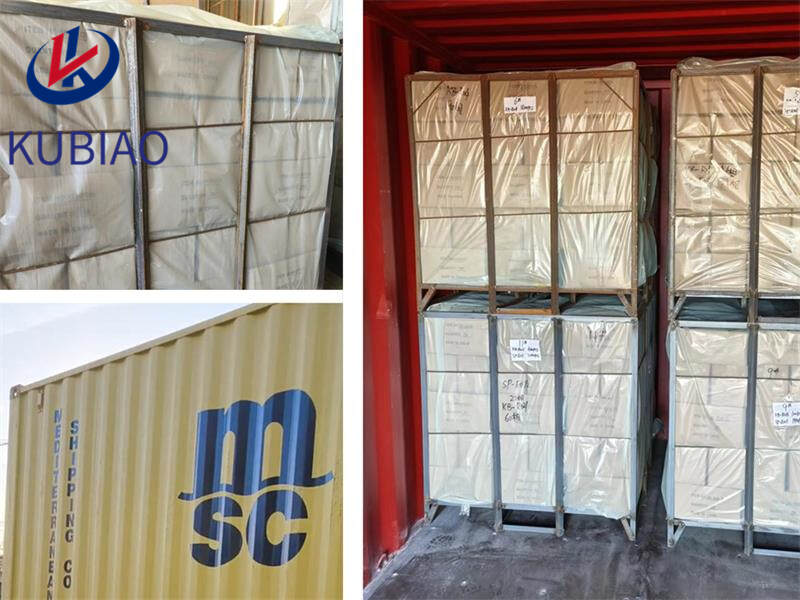
| Product name | decorative iron ornament |
| Keyword | iron casting collar ,ornamental collar,metal spearheads ,cast iron fence ornamental ,iron fence collar,cast iron panels spearhead ,casting decoration |
| Place of Origin | China |
| Quality standard | We have our own professional QC team to insure the quality. |
| Feature | Cast iron is a strong metal material that can withstand large amounts of pressure and weight. It is also durable and resistant to corrosion, making it ideal as a decorative item |
| Application scope | Hotel, etc. |
| surface treatment | sand blasting antirust antirust oil/water painting hot dip galvanizing |
| Unit Weight(g) | 300(Contact us for specific information to confirm) |
| terms of payment | 50% T/T in advance, balance before shipment. |
| Life span | 23 years (Contact us for specific information to confirm) |
| delivery time | It usually takes 40 days. |
| Advantage | We keep good quality and competitive price to ensure our customers benefit |
| Packing | 13x15.69x11cm(Contact us for specific information to confirm) |
| OEM/ODM | Customization Service Provided |
| design | beautiful elegance sleek pretty |
| Sales country | All over the world for example:Isle of Man,Zambia,Uganda,Chad,Somalia,Grenada,Uzbekistan,Wallis and Futuna |
| MOQ | 279pcs(Contact us for specific information to confirm) |
1.Can I use decorative iron ornament in a historical restoration project?
Our decorative iron ornament products have competitive and differentiated advantages, and actively promote digital transformation and innovation. Yes, cast iron ornaments can be used in a historical restoration project. Cast iron was a popular material used in architectural ornamentation during the 19th and early 20th centuries, so it would be historically accurate to use it in a restoration project. However, it is important to ensure that the cast iron ornaments are authentic to the time period and style of the building being restored. It is also important to properly maintain and preserve the cast iron to prevent deterioration and maintain its historical integrity.
2.Are there any famous examples of decorative iron ornament in famous buildings?
We have established long-term and stable partnerships with our suppliers, so we have great advantages in price and cost and quality assurance.
1. Eiffel Tower - The iconic Parisian landmark features cast iron ornaments in its intricate lattice design.
2. Grand Central Terminal - The main concourse of this New York City train station is adorned with cast iron chandeliers and decorative elements.
3. Buckingham Palace - The gates and railings of the royal residence in London are made of cast iron, featuring ornate designs and crests.
4. St. Pancras Station - This Victorian railway station in London is known for its elaborate cast iron roof and decorative elements.
5. New York Public Library - The main branch of the NYPL features cast iron lamp posts and decorative grilles on its exterior.
6. The Palace of Westminster - The Houses of Parliament in London feature cast iron elements, including the iconic Big Ben clock tower.
7. The Iron Bridge - This 18th century bridge in Shropshire, England is considered a masterpiece of cast iron engineering and design.
8. The Smithsonian Castle - The oldest building on the National Mall in Washington D.C. features cast iron columns and decorative elements.
9. The Royal Albert Hall - This concert hall in London features a cast iron dome and decorative friezes on its exterior.
10. The Flatiron Building - This iconic New York City skyscraper is known for its unique triangular shape and cast iron facade.
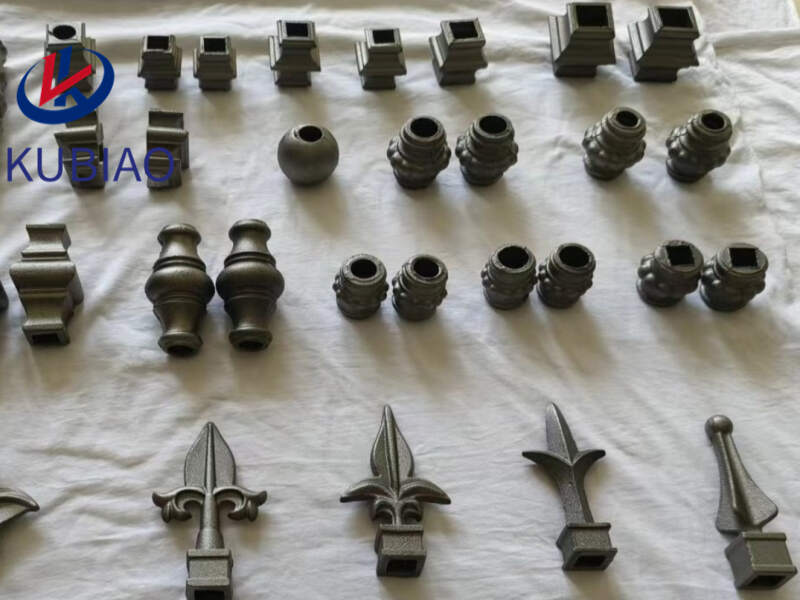
3.How do I properly hang or display decorative iron ornament ?
We have a wide range of decorative iron ornament customer groups and establishes long -term cooperative relationships with partners. The countries we provide services include Isle of Man,Zambia,Uganda,Chad,Somalia,Grenada,Uzbekistan,Wallis and Futuna.
1. Choose a sturdy and secure location: Cast iron ornaments can be heavy, so it is important to choose a location that can support their weight. Avoid hanging them on weak or flimsy surfaces.
2. Use appropriate hardware: Make sure to use strong and durable hardware, such as heavy-duty hooks or screws, to hang your cast iron ornaments. Avoid using adhesive hooks or tape, as they may not be strong enough to hold the weight.
3. Consider the weather: If you are hanging your cast iron ornaments outdoors, make sure to use weather-resistant hardware and consider the elements. For example, if you live in a windy area, you may need to use additional hardware or secure the ornament with wire to prevent it from falling.
4. Use a level: Before hanging your ornament, use a level to ensure it is straight and even. This will help prevent it from tilting or falling off the wall.
5. Hang with care: When hanging your ornament, make sure to handle it with care to avoid damaging it. If the ornament has delicate or intricate details, use a soft cloth or gloves to handle it.
6. Display on a stand: If you prefer not to hang your cast iron ornament, you can also display it on a stand or shelf. Make sure the stand is sturdy enough to support the weight of the ornament.
7. Group similar ornaments together: If you have multiple cast iron ornaments, consider grouping them together for a cohesive display. This can also help distribute the weight evenly and prevent any one ornament from becoming too heavy for the display surface.
8. Regularly check for damage: Cast iron ornaments can be prone to rust and corrosion, especially if displayed outdoors. Make sure to regularly check for any signs of damage and address them promptly to prevent further deterioration.
4.Are there any collectible decorative iron ornament ?
We have a professional team that is committed to the innovation and development of decorative iron ornament .
Yes, there are many collectible cast iron ornaments available. Some popular examples include vintage cast iron doorstops, bookends, figurines, and holiday decorations. These items are highly sought after by collectors due to their historical significance, intricate designs, and durability. Some well-known brands that produce collectible cast iron ornaments include Hubley, Bradley & Hubbard, and Griswold.
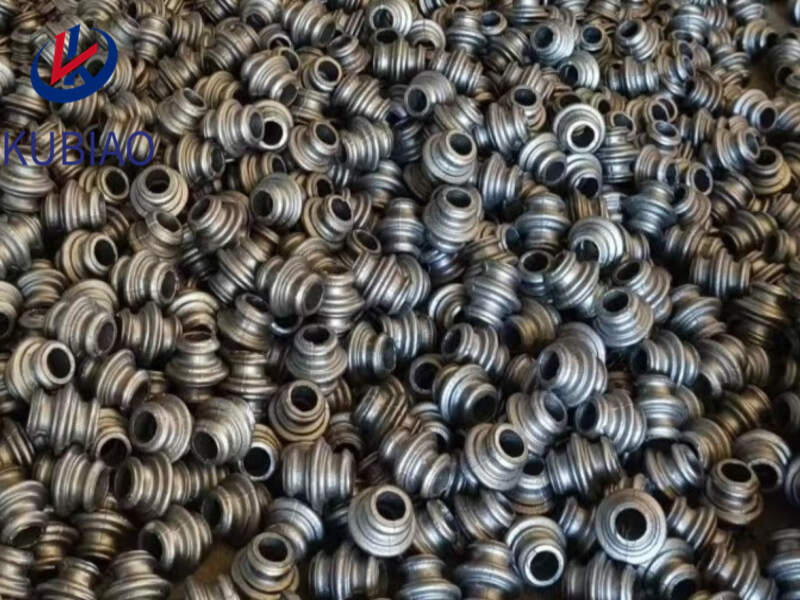
5.How can I clean and maintain decorative iron ornament ?
We have established a good reputation and reliable partnerships within the decorative iron ornament industry.
1. Remove any dirt or debris: Use a soft-bristled brush or cloth to remove any dirt or debris from the surface of the cast iron ornament.
2. Wash with mild soap and water: Mix a small amount of mild soap with warm water and use a cloth or brush to gently scrub the ornament. Rinse with clean water and dry thoroughly with a towel.
3. Remove rust: If there is any rust on the ornament, use a wire brush or sandpaper to gently scrub it off. You can also use a commercial rust remover if the rust is stubborn.
4. Apply a protective coating: To prevent future rusting, apply a thin layer of oil or a specialized cast iron sealer to the ornament. Be sure to follow the manufacturer's instructions for application.
5. Store in a dry place: Moisture can cause cast iron to rust, so it is important to store your ornaments in a dry place when not in use.
6. Avoid harsh chemicals: Avoid using harsh chemicals or abrasive cleaners on your cast iron ornaments as they can damage the surface.
7. Regularly inspect and touch up: Inspect your ornaments regularly for any signs of rust or damage. If you notice any, clean and touch up the affected area immediately to prevent further damage.
8. Protect from extreme temperatures: Extreme temperatures can cause cast iron to expand and contract, leading to cracks or damage. Avoid exposing your ornaments to extreme heat or cold.
9. Handle with care: Cast iron ornaments can be heavy and fragile, so handle them with care when moving or storing them.
10. Seek professional help if needed: If your cast iron ornament is heavily rusted or damaged, it may be best to seek professional help for restoration.
6.How are decorative iron ornament used in home decor?
We have advanced production equipment and technology to meet the needs of customers, and can provide customers with high quality, low priced decorative iron ornament products.
1. Wall Decor: Cast iron ornaments can be used as wall decor by hanging them on the wall using hooks or nails. They can add a vintage and rustic touch to any room.
2. Bookends: Cast iron ornaments in the shape of animals, plants, or other objects can be used as bookends to keep books in place on a shelf or table.
3. Doorstops: Heavy and sturdy cast iron ornaments can be used as doorstops to hold doors open. They can also add a decorative element to the room.
4. Garden Decor: Cast iron ornaments can be used in the garden as decorative pieces. They can be placed on a garden wall, hung from a tree, or used as a centerpiece in a flower bed.
5. Fireplace Accessories: Cast iron ornaments such as fire grates, firebacks, and fireplace tools can add a traditional and elegant touch to a fireplace.
6. Table Centerpieces: Small cast iron ornaments can be used as table centerpieces. They can be placed on a tray or in a bowl with other decorative items to create a unique and eye-catching display.
7. Kitchen Decor: Cast iron ornaments in the shape of fruits, vegetables, or kitchen utensils can be used as decorative pieces in the kitchen. They can be displayed on a shelf or hung on the wall.
8. Candle Holders: Cast iron ornaments can be used as candle holders by placing a candle on top or inside them. They can add a touch of warmth and coziness to any room.
9. Coat Hooks: Cast iron ornaments in the shape of hooks can be used as coat hooks in an entryway or mudroom. They can add a functional and decorative element to the space.
10. Furniture Accents: Cast iron ornaments can be used as accents on furniture pieces such as tables, chairs, and cabinets. They can add a unique and personalized touch to the furniture.
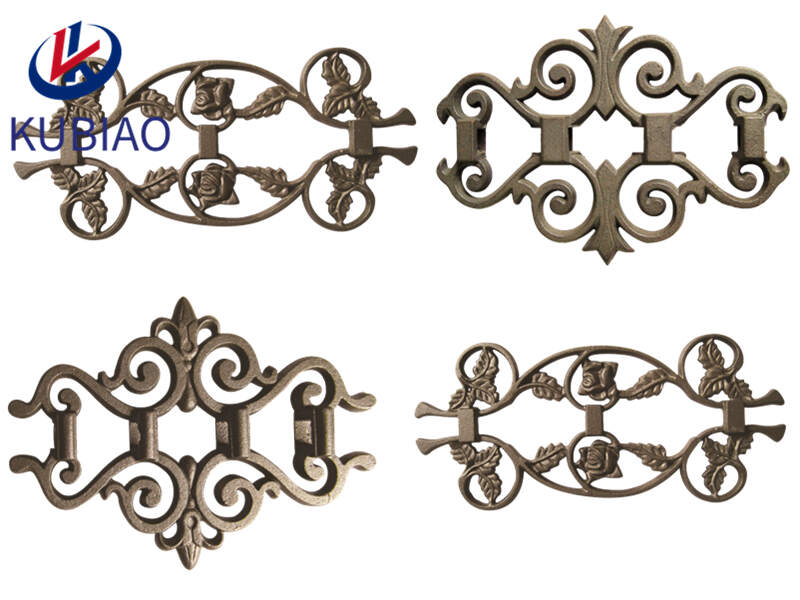
7.What is the history of decorative iron ornament ?
We pay attention to the introduction and training of talents, scientifically regulate the management system, and focus on cultural construction and team cohesion.
Cast iron ornaments have a long and rich history dating back to ancient civilizations. The use of cast iron for decorative purposes can be traced back to the 5th century BC in China, where it was used to create intricate and ornate objects such as bells and statues.
In Europe, the use of cast iron for decorative purposes began in the 15th century, with the production of cast iron firebacks and grates for fireplaces. These were often adorned with intricate designs and patterns, and were considered a symbol of wealth and status.
During the Industrial Revolution in the 18th and 19th centuries, cast iron became more widely available and affordable, leading to an increase in its use for decorative purposes. Cast iron ornaments were used to decorate buildings, parks, and gardens, and were also popular as household items such as door knockers, garden furniture, and garden urns.
In the late 19th and early 20th centuries, the Victorian era saw a surge in the popularity of cast iron ornaments. The ornate and elaborate designs of the Victorian era were perfectly suited to the versatility of cast iron, and it was used extensively in the construction of buildings, bridges, and other structures.
However, with the advent of new materials such as steel and aluminum, the use of cast iron for decorative purposes declined in the 20th century. It was not until the lat<
br> 20th century that there was a renewed interest in cast iron ornaments, with a growing appreciation for their historical and aesthetic value.
Today, cast iron ornaments are still used to decorate buildings, parks, and gardens, and are also popular as collectibles and antiques. They are valued for their durability, intricate designs, and historical significance, and continue to be a popular choice for adding a touch of elegance and charm to any space.
8.How have decorative iron ornament evolved over time?
We focus on innovation and continuous improvement to maintain a competitive advantage.
Cast iron ornaments have evolved significantly over time, both in terms of their design and production methods. Here are some key changes that have occurred:
1. Early designs: The earliest cast iron ornaments were simple and functional, such as door knockers, hinges, and fireplace tools. These were often made using sand casting techniques and had a utilitarian look.
2. Victorian era: In the mid-19th century, cast iron ornaments became more decorative and ornate, reflecting the Victorian love for intricate designs and embellishments. This era saw the rise of cast iron garden furniture, fountains, and statues, often featuring elaborate floral and animal motifs.
3. Industrial revolution: With the advent of the industrial revolution, cast iron ornaments became more affordable and accessible to the middle class. This led to a proliferation of cast iron products, including street lamps, railings, and building facades.
4. Art Nouveau and Art Deco: In the late 19th and early 20th centuries, cast iron ornaments were influenced by the Art Nouveau and Art Deco movements, which favored more fluid and geometric designs respectively. This led to the creation of cast iron gates, grilles, and other architectural elements with intricate patterns and motifs.
5. Modern era: In the 20th century, cast iron ornaments continued to evolve, with a focus on functionality and minimalism. Modern designs often feature clean lines and geometric shapes, and are used in a variety of applications, from furniture to home decor.
6. Production methods: While sand casting was the primary method of producing cast iron ornaments in the past, modern techniques such as die casting and investment casting have made the process more efficient and precise. This has allowed for the creation of more intricate and detailed designs.
7. Materials: While cast iron was the preferred material for ornaments in the past, modern advancements have led to the use of other materials such as aluminum and bronze. These materials offer greater strength and durability, while still retaining the look and feel of cast iron.
Overall, cast iron ornaments have evolved from simple and functional objects to highly decorative and versatile pieces, reflecting the changing tastes and advancements in technology over time.
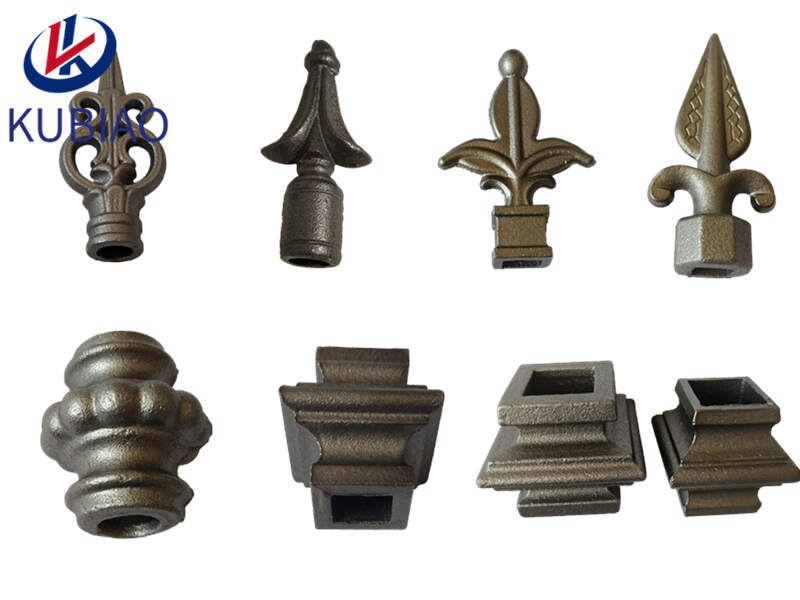
9.What are decorative iron ornament ?
We have flexible production capacity. Whether you are large orders or small orders, you can produce and release goods in a timely manner to meet customer needs.
Cast iron ornaments are decorative objects made from cast iron, a type of iron that is heated until it becomes molten and then poured into a mold to create a specific shape. These ornaments can range from small figurines and sculptures to larger architectural elements such as columns, balusters, and finials. They are often used to add a touch of elegance and charm to gardens, homes, and other outdoor spaces. Cast iron ornaments are known for their durability and can withstand harsh weather conditions, making them a popular choice for outdoor decor. They can also be painted or finished in various colors and styles to suit different design preferences.
10.What is the weight limit for hanging decorative iron ornament ?
We have broad development space in domestic and foreign markets. decorative iron ornament have great advantages in terms of price, quality, and delivery date.
The weight limit for hanging cast iron ornaments can vary depending on the strength and stability of the hanging mechanism and the thickness and quality of the cast iron. In general, it is recommended to not exceed 10-15 pounds for hanging cast iron ornaments. It is always best to check the specific weight limit recommended by the manufacturer or consult with a professional for heavier or larger ornaments.
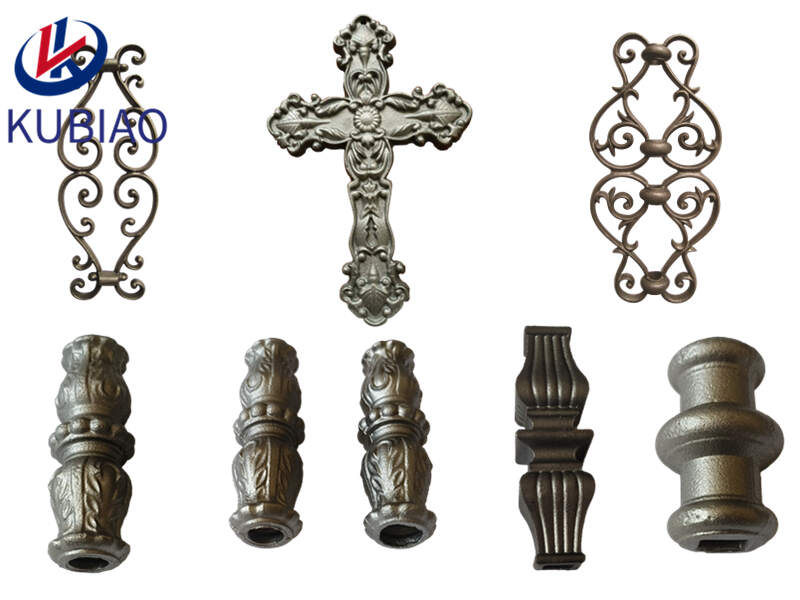
Welcome to contact us for Cast Iron Order!
Email: sales@kubiaometal.com
Cellphone/Whatsapp: 0086 13020588163
Wechat: 13028588163
Tag:cast iron fence sections,decorative iron fence panel ,cast iron rose,cast iron gate ornaments,casting spears,cast iron bases,cast iron rosettes
PREV: decorative iron panels
Product
Category